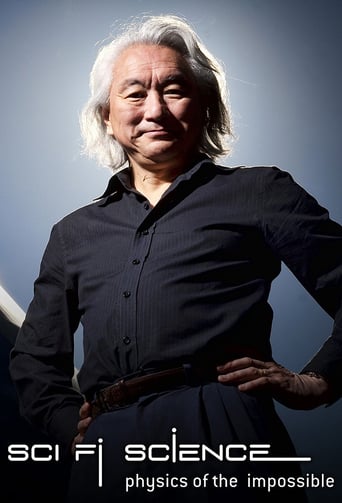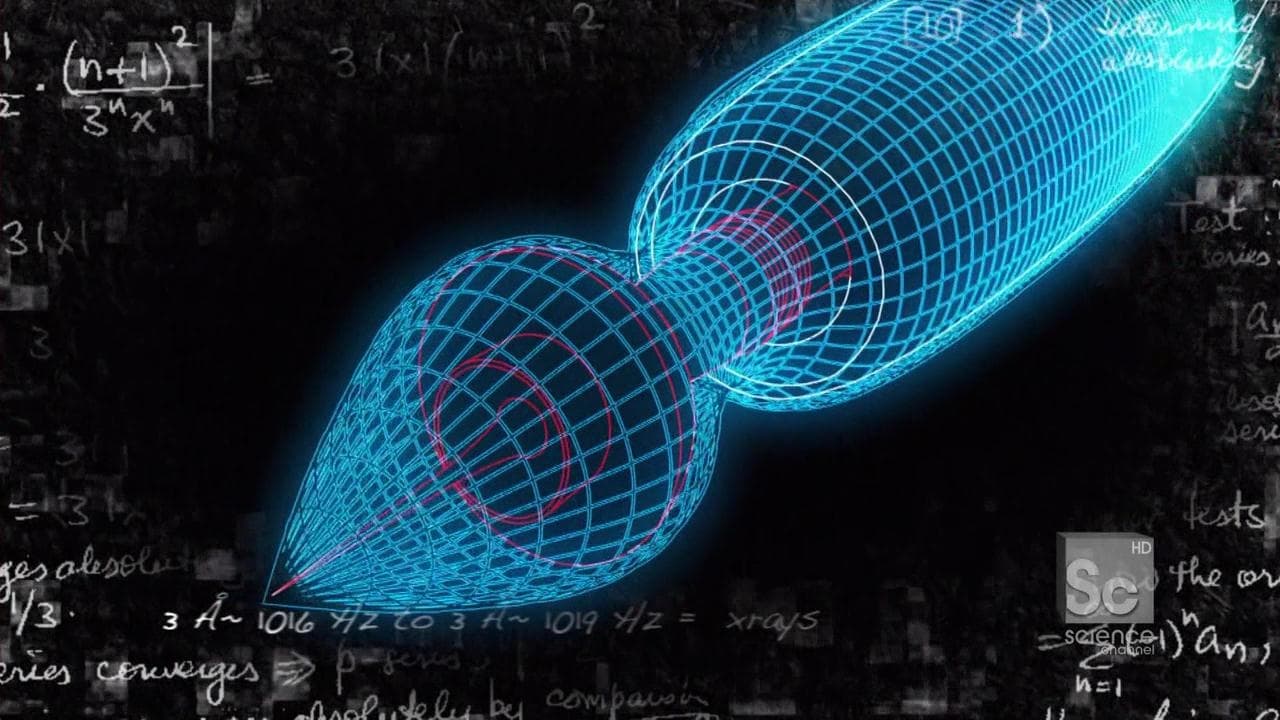

Sci Fi Science: Physics of the Impossible is an American documentary television series on Science which first aired in the United States on December 1, 2009. The series is hosted by theoretical physicist Michio Kaku and is based on his book Physics of the Impossible. In each episode, Dr. Kaku addresses a technological concept from science fiction and designs his own theoretical version of the technology using currently-known science. He also visits scientists developing technology related to the episode's concept.

According to Hollywood, evil robots are all around us, disguised as cars and trucks. But what the movies don't explain is what kind of mechanical power allows a Camero to stand up and move around like a human. Dr. Michio Kaku is on a quest to build a real life shapeshifting Transformer. On the way, he takes a ride in the amazing hydraulic cars of New York's 'Lunatic Low Riders' and explains the awesome power of a hydraulic smashing crane. At Pittsburgh Zoo, he gets an audience with Nature's greatest transformer — a color changing, shapeshifting, fifty pound hunk of muscle that can squeeze itself through a hole the size of a quarter. Over at Carnegie Mellon, researchers are more impressed with the abilities of the snake. Their robotic serpent can adapt itself to any terrain as it searches for the survivors of disasters. Its modular design impresses Michio as he puts the finishing touches to his very own version of Optimus Prime.

Dr. Michio Kaku believes there is nothing stopping us from building a holodeck straight out of Star Trek. He's on a mission to create an imaginary world indistinguishable from the real thing. At Rowan University, Michio experiences total immersion virtual reality as he takes on a T-Rex. Later, he goes on a patrol with the U.S. Army as he comes to grips with their omni-directional treadmill. Seth Goldstein at Carnegie Mellon explains how programmable matter will mean objects can shapeshift at the touch of a button. The only limits to a holodeck experience will be imagination itself.

Imagine a world ruled by artificial intelligence where humans have been wiped out. This is no sci-fi fantasy. We're fast approaching the moment when machines will be smarter than we are! We need a plan to stay on top and Dr. Michio Kaku is on the case. He's recruited help from some of America's top experts. Technology guru Marshall Brain thinks we may be only 40 years away from what scientists call 'The Singularity'. Michio considers AI researcher Ben Goertzel's proposal for a nanny artificial intelligence that will keep track of any rogue machine with a grudge against humanity. It's certainly one solution — but Michio's final design is even more audacious...

Science fiction is full of terrifying man-machines whose awesome power can crush any opponent. But could we one day build our own army of superhuman cyborgs to protect us from extraterrestrial threats? Dr. Michio Kaku thinks so. Advances in biomechanics mean we can already meld nerve endings and robotic body parts. On a combat exercise in Fort Benning, Georgia, Michio road tests the U.S. Army's latest communications system — could it be the first step toward a Borg like collective consciousness? A stunning breakthrough in wireless electricity transfer hints at how a cyborg army might get the juice needed to stay on the march. The cutting edge of nano-tech reveals a future world where tiny machines manipulate DNA and alter the human body at the level of the cell. Recruitment for the cyborg army could begin sooner than you think.

In sci fi, the most destructive force in the entire universe is also the key to traveling to a whole host of mind-blowing destinations. Jump through a black hole and you might end up in another universe or in another part of space and time. Dr. Michio Kaku aims to sort fact from fiction and work out how to travel through a black hole...and survive. On the way, he meets Dr. Andrew Hamilton who has used Einstein's equations to build a black hole simulator. Michio takes a ride and finds out firsthand why this kind of trip is so bad for your health. He visits a pasta factory to show the frightening effects of what scientists have dubbed "spaghettification". Professor Gerald Cecil, an expert on super massive black holes, explains how they are sometimes hurled out of galaxies into empty space. This huge, cataclysmic process may provide the ticket for anyone who wants to take the plunge and fly through the heart of black hole.

Dr. Michio Kaku takes on the biggest and deadliest war machine in science fiction — the Death Star. We've all seen Luke Skywalker in action but could a lone star fighter really take out a battle station as a big as a moon? Michio brings physics to bear on the most iconic scene in sci fi. He talks swarm tactics with top gun pilot Colonel Rod Zastrow, who flew an F15 in the Gulf War, and reveals the truth about dogfights in space. Space shuttle pilot Ken Rogers explains how real spaceships maneuver and at Columbia University's centrifuge, Michio comes up with a novel solution to the G-Force problem. In North Carolina, a rail gun that can fire a projectile at twelve times the speed of sound shows how we might one day equip our own star fighters.

Today on Discovery Enterprise we join Dr. Michio Kaku on a mission to make first contact with highly advanced extraterrestrial civilizations.Explore the world of the seemingly impossible with the series SCI FI SCIENCE. Hosted by internationally-renowned physicist and co-founder of string field theory, Dr. Michio Kaku, this series poses the idea that science fiction may not be so far from science

The aliens are coming! It's the cry at the heart of hundreds of sci fi movies. Dr. Michio Kaku asks, "What would we really do if a hostile alien race were intent on invading the Earth?" It seems like a hopeless scenario — any extraterrestrial aggressors who did show up would be far superior to us. But Michio has a plan to save the world. Professors Paul Davies and Max Tegmark are skeptical. They believe that faced with invasion by super advanced beings, our only sensible option would be immediate surrender. But Michio is no quitter and rolls out an audacious defense plan across the entire solar system. A visit to a Judo dojo provides inspiration for a final line of defense based on a martial arts tactic that he believes could save the entire human race.

Behold, Dr. Michio Kaku's most ambitious plan yet — the construction of a new solar system. He meets Paul Butler of the Carnegie Institution who identifies 47 Ursae Majoris as our nearest suitable star. But with no Earth planets in orbit, it sure doesn't feel like our solar system. Gravity could be used to manipulate a moon into an Earth like position. But Kaku's thinking bigger than that. If he's building a whole new solar system for humanity, surely he should be able to harness the power of our new sun! So he comes up with an incredible plan to completely encircle the sun with a giant sphere, which will act as a huge energy collector. What's more, once it starts spinning we'll be able to settle on the inside and become a truly stellar civilization.

Dr. Michio Kaku is on a mission to save planet Earth. Nearly 90 percent of the rocks in space are big enough to destroy our civilization. And it's not a question of if they'll hit our planet, but when. He shows what would happen if we really did use nuclear weapons to blow up an incoming asteroid and comes up with a safer, rocket-powered solution. Kaku meets up with Harvard's Professor Brian Marsden, who explains how a massive comet could smash into Earth without warning. To deal with the multiple threats, Kaku takes a lead from Star Wars and designs a system of laser-equipped Death Stars to zap the space rocks before they hit us.

Dr. Michio Kaku shows how science fiction's most inspiring vision — the colonization of the galaxy — could become reality. At the Carnegie Mellon Institute, Dr. Pei Zhang demonstrates his robot probes and Kaku shows how these swarmbots could be used to find habitable planets. He enlists the help of spacecraft engineer Mason Peck to explain how Jupiter's magnetism could power the tiny craft into deep space. But once the probes are there and establish bases, how do colonists cover the vast distances of space? Kaku rejects the staple sci fi solutions of suspended animation and galaxy ships. With the help of his friend, the astrophysicist Max Tegmark, comes up with a far more radical plan that you won't believe.

Dr. Michio Kaku believes it is possible to transform a neighboring Planet into a second Earth. Space scientist Geoff Landis demonstrates how we could build floating cities in the gaseous atmosphere of Venus. The nightmarish conditions on the planet's surface lead Kaku to look farther afield and he meets up with Bob Zubrin from the Mars Society, who explains how the Red Planet could be geoengineered. Mars already has water, but all of it is frozen solid. So Chris McKay, a NASA research scientist, offers an audacious solution — build a huge solar mirror the size of Texas to melt the Martian ice caps. Michio eventually hits on an even more daring plan — heat up Mars by shooting asteroids at the planet's surface. The resulting Armageddon could eventually lead to the birth of Earth 2.0.
Sci Fi Science: Physics of the Impossible is an American documentary television series on Science which first aired in the United States on December 1, 2009. The series is hosted by theoretical physicist Michio Kaku and is based on his book Physics of the Impossible. In each episode, Dr. Kaku addresses a technological concept from science fiction and designs his own theoretical version of the technology using currently-known science. He also visits scientists developing technology related to the episode's concept.